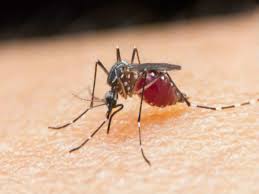
(INDIANAPOLIS ) — State health officials are urging Indiana residents to protect themselves from mosquito bites following reports of a probable case of Eastern equine encephalitis (EEE) in a LaPorte County resident and the detection of the virus in horses in northern Indiana.
As of Sept. 14, two horses in LaGrange County and one horse in Kosciusko County have tested positive for EEE virus. Because there is suitable habitat for mosquitoes throughout the area, residents of all northern Indiana counties should take precautions.
In 2019, northern Indiana experienced a significant outbreak of EEE virus activity, resulting in 14 horse cases, one fatal human case and one positive mosquito sample.
“Eastern equine encephalitis virus disease is rare in humans but can cause permanent complications and even death,” said State Health Commissioner Kris Box, M.D., FACOG. “While all Hoosiers are at risk for mosquito-borne diseases, northern Indiana residents need to be especially vigilant right now.”
State health officials recommend that all Hoosiers take the following steps to prevent mosquito bites:
- Avoid being outdoors when mosquitoes are active (especially late afternoon, dusk to dawn, and early morning)
- Use an EPA-registered insect repellent containing DEET, picaridin, IR3535, oil of lemon eucalyptus, or 2-undecanone on clothes and exposed skin
- Cover exposed skin by wearing a hat, long sleeves and long pants in places where mosquitoes are especially active, such as wooded areas
- Install or repair screens on windows and doors to keep mosquitoes out of your home
You can eliminate mosquito breeding sites from your property by doing the following:
- Discard old tires, tin cans, ceramic pots or other containers that can hold water
- Repair failed septic systems
- Drill holes in the bottom of recycling containers left outdoors
- Keep grass cut short and shrubbery trimmed
- Clean clogged roof gutters, particularly if leaves tend to plug up the drains
- Frequently replace the water in pet bowls
- Flush ornamental fountains and birdbaths periodically
- Aerate ornamental pools, or stock them with predatory fish
While rare, EEE virus can cause serious illness and has a fatality rate of around 33 percent or higher in people. Many individuals who recover may still experience long-term complications. Symptoms of EEE virus include chills, fever, body aches and joint pain.
Some people develop a more severe form of the disease affecting the nervous system and causing encephalitis, or inflammation of the brain.
People who are younger than 15 and older than 50 are at the greatest risk of severe disease if infected with EEE virus. People who think they may have EEE virus should visit a healthcare provider.
To see the latest results of the Indiana Department of Health’s mosquito surveillance program, go to https://gis.in.gov/apps/ISDH/Arbo/.
To learn more about EEE virus, visit the state Department of Health’s website at https://www.in.gov/isdh/28258.htm.



